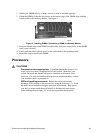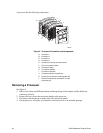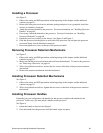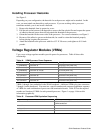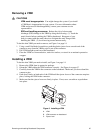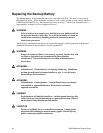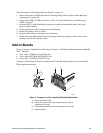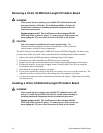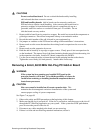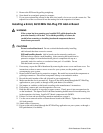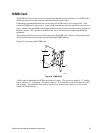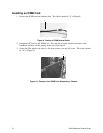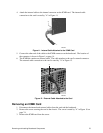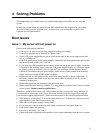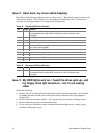
Removing and Installing Baseboard Components 71
CAUTIONS
Do not overload baseboard: Do not overload the baseboard by installing
add-in boards that draw excessive current.
ESD and handling boards: Add-in boards can be extremely sensitive to
ESD and always require careful handling. After removing the board from its
protective wrapper or from the baseboard, place it component-side up on a
grounded, static-free surface or conductive foam pad—if available. Do not
slide the board over any surface.
1. Remove add-in board from its protective wrapper. Be careful not to touch the components or
gold edge connectors. Place board component-side up on an antistatic surface.
2. Record the serial number of the add-in board in your equipment log.
3. Set jumpers or switches on the PCI board according to the manufacturer’s instructions.
4. Remove and save the screw that attaches the existing board or expansion slot cover to the
chassis.
5. Remove and save the expansion slot cover.
6. Hold the add-in board by its top edge or upper corners. Firmly press it into an expansion slot
on the baseboard. The tapered foot of the board-retaining bracket must fit into the mating slot
in the expansion slot frame. Install a PCI board component-side DOWN.
7. Use the screw removed earlier to fasten the new board-retaining bracket to the chassis.
Tighten the screw firmly (6.0 inch-pounds). Attach cables if necessary.
Removing a 64-bit, 66/33 MHz Hot-Plug PCI Add-in Board
WARNING
If the system has been running, any installed PCI board on the
processor board(s) will be hot. To avoid the possibility of a burn, be
careful when removing or installing baseboard components that are
located near processors.
CAUTION
Slot covers must be installed on all vacant expansion slots. This
maintains the electromagnetic emissions characteristics of the system and
ensures proper cooling of system components.
See Figure 7 on page 69.
1. Observe the safety and ESD precautions at the beginning of this chapter.
2. Make sure that the slot is powered off. If the slot is powered on, turn the power to the slot off
through the PCI Hot-Plug application on your system. If the system has a HW push-button,
press it to turn the power to the slot off.
3. Disconnect any cables attached to the board you are removing.
4. If there is a front and rear Hot-Plug retention mechanism, release it.



